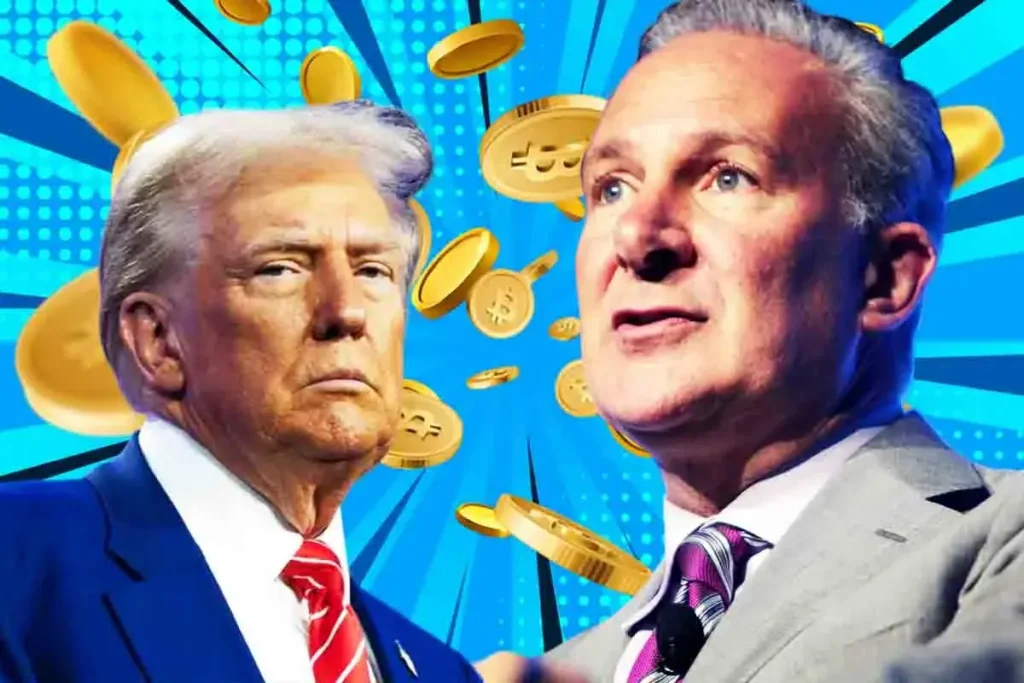The Battle Over Bitcoin: Trump vs. Schiff
In recent debates surrounding the future of cryptocurrency in the United States, the conflict between economist Peter Schiff and former President Donald Trump has emerged as a focal point of discussion. Schiff has been vocal about his concerns regarding Bitcoin, particularly as Trump expresses his support for the digital currency. Schiff argues that Bitcoin poses significant risks to the U.S. economy, particularly in terms of the declining demand for the U.S. dollar. This article explores their differing views and the implications of Bitcoin on the American economy.
Trump’s Enthusiasm for Bitcoin
Former President Donald Trump has publicly touted the benefits of Bitcoin, framing it as a revolutionary financial instrument that could bolster the U.S. economy. In a statement, he underscored Bitcoin’s ability to alleviate pressure on the dollar and create jobs, pointing to its strong performance compared to the stagnant stock market. Trump is betting on Bitcoin as a potential economic savior, highlighting the tech-savvy nature of the crypto space and its growing acceptance among investors. However, his endorsement comes amid a backdrop of skepticism, particularly from traditional economists like Schiff.
Schiff’s Economic Concerns
Economist Peter Schiff has criticized Trump’s pro-Bitcoin stance, arguing that the influx of dollars being converted into Bitcoin could undermine the influence and value of the U.S. dollar. He asserts that when individuals sell dollars to invest in Bitcoin, it weakens the currency’s global standing and fuels economic instability. Schiff’s critique hints at a larger concern: that the burgeoning interest in cryptocurrencies could lead to a diversion of investments away from traditional financial avenues, with repercussions for the U.S. economy at large. His insights shed light on the potential consequences of widespread Bitcoin adoption, especially as it becomes more intertwined with mainstream financial practices.
Government’s Role in Bitcoin Adoption
While the federal government has not explicitly embraced Bitcoin as a mechanism for economic recovery, it is setting the stage for broader cryptocurrency adoption. Initiatives like the establishment of a Strategic Bitcoin Reserve signal a growing acknowledgment of digital assets. Various states are following suit, positioning themselves to hold Bitcoin through capital allocations and investment strategies. Although these steps suggest a shift towards embracing cryptocurrency, Schiff warns that the government’s actions might inadvertently contribute to the weakening of the dollar, posing significant ramifications for the country’s financial stability.
Trump’s Business Ties to Cryptocurrency
Beyond his presidential perspective, Trump’s financial interests in cryptocurrency further complicate the narrative. His media company has amassed a considerable sum—$2.3 billion—through Bitcoin treasury operations. Critics, including Schiff, suggest that Trump’s crypto endeavors may be strategically aligned with his broader business goals, particularly in attracting affluent donors from the cryptocurrency space. This raises ethical questions about leadership influence over financial policies, particularly if personal financial gains overshadow national economic considerations.
The Controversy Over Cryptocurrency
Trump’s involvement with cryptocurrencies has not been without controversy. His hosting of leading TRUMP meme coin holders at a White House dinner drew significant public backlash, with critics accusing him of prioritizing personal profit over sound economic principles. Additionally, the partnership between the Trump family’s business ventures and cryptocurrency investments highlights a growing tension between political motives and financial opportunism, raising red flags about the potential normalization of crypto in political circles.
Conclusion: A Divided Outlook
The debate between Peter Schiff and Donald Trump encapsulates the broader struggle over the future of currency and financial policy in the United States. Trump views Bitcoin as a modern, beneficial asset that can revitalize the economy, while Schiff cautions against its potential pitfalls. As the discourse around cryptocurrency continues to evolve, it is imperative for stakeholders to weigh the economic risks and rewards carefully. This ongoing battle will undoubtedly shape the financial landscape, impacting how Americans view both traditional currencies and emerging technologies like Bitcoin.
In light of this, investors and policymakers must remain informed about both perspectives, fostering an environment of responsible financial stewardship as they navigate the complexities of a rapidly changing economic landscape.


